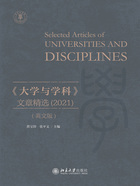
Theoretical Reflection and Practical Inquiry on the Construction and Evaluation of Disciplines with Chinese Characteristics in the New Era
HUANG Baoyin, LIN Mengquan and CHEN Yan
(China Academic Degrees & Graduate Education Development Center, Beijing 100083)
About the authors: Huang Baoyin, male, director of China Academic Degrees & Graduate Education Development Center; Lin Mengquan, male, a researcher of China Academic Degrees & Graduate Education Development Center; and Chen Yan, female, a post doctorate of China Academic Degrees & Graduate Education Development Center.
Abstract: In the context of the modernization of the national education governance system and governance capacity, it is of theoretical and practical significance to improve the academic governance capabilities and levels of universities, improve the discipline evaluation system, and play the correct guiding role of evaluation. Based on the connotation of the discipline in the new era, this paper analyzes the relationship between discipline construction and university development in terms of policy logic, academic logic, and development logic, and explores the special status of discipline evaluation in the modernization of university governance, especially for the promotion of the discipline construction. It proposes the strategic choices for the Chinese discipline evaluation in terms of organizational bodies, evaluation criteria and evaluation plans, in order to provide a reference for the establishment of the Chinese discipline evaluation system with Chinese characteristics and world influence, and enhance the modern governance capabilities and levels of higher educational institutions in China.
Keywords: discipline construction; discipline evaluation;Chinese discipline evaluation; university governance
Discipline is the foundation of a university, a cell and basic unit in university, and the main carrier for university functioning. Discipline construction and development are of the same range as university development. Discipline evaluation is an important approach to testing and monitoring the progress of discipline construction, proving the effect of university governance and implementing “consequential supervision” , a key node in university governance, and support for university and discipline development. The 4th plenary session of the 19th CPC Central Committee determined that one of the major tasks in achieving the two centenary goals was to advance the modernization of China's system and capacity for governance. In such a context, university governance is an important part of national governance and it's necessary to improve the academic governance capabilities and levels of universities, the scientific evaluation system, and play the correct guiding role of evaluation. The General Office of the CPC Central Committee and General Office of the State Council issued the Implementation Plan for Accelerating Education Modernization (2018—2022) , which clearly states “evaluating the master's degree level and first-class discipline level” . One of the new topics to be addressed in the new era is how to implement the instructions from General Secretary Xi Jinping on fundamentally solving the educational evaluation “baton” problem, improve the discipline evaluation mechanism, practically serve the connotative development of university disciplines in China, and improve the effectiveness of university discipline governance in accordance with the national development strategy and educational practice in China. Based on reflection and analysis on the relationship between discipline construction and university development and the special status and role of discipline evaluation in the modernization of university governance, this paper focuses on exploring and proposing strategic choices for the Chinese discipline evaluation, to establish a Chinese discipline evaluation system with Chinese characteristics and world influence, and enhance the modern governance capabilities and levels of higher educational institutions in China.